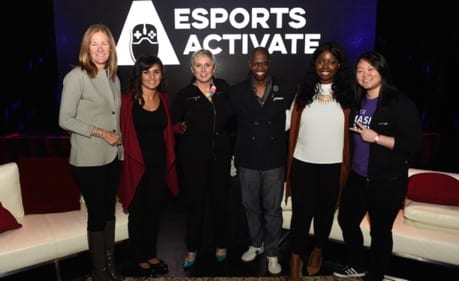 Last week I had the opportunity to speak on the Women in Esports panel at the Esports Activate Conference. This conference allows esports brands, and video game organizations, companies and executives, to showcase and preview their digital, experiential, media, content, and sponsorships opportunities. The day-long event featured speakers and panelists from media companies like Vice to esports companies such as ESL (formerly known as the Electronic Sports League), a major esports broadcaster on Twitch.
Last week I had the opportunity to speak on the Women in Esports panel at the Esports Activate Conference. This conference allows esports brands, and video game organizations, companies and executives, to showcase and preview their digital, experiential, media, content, and sponsorships opportunities. The day-long event featured speakers and panelists from media companies like Vice to esports companies such as ESL (formerly known as the Electronic Sports League), a major esports broadcaster on Twitch.
Whether you’re currently activating in esports or new to the space, one thing is for certain – esports is here to stay. With Millennial and Gen Z audiences becoming increasingly difficult to reach through traditional channels, esports represents a unique opportunity for brands to get in front of this elusive demographic. Esports and Competitive Video Gaming is moving at a speed and intensity that is unparalleled in entertainment and in reaching Millennials and GenZ audiences.
Here are a few of my biggest key learnings and takeaways from the event…
Segmentation is Key:
One of the biggest misconceptions and mistakes that brands are making is the assumption that a fan of one esports title is a fan of them all. While it is often assumed that all esports fans have the same habits and influencers, a close analysis highlights notable nuances across fans in the U.S., U.K., France and Germany. Understanding these nuances is essential when developing a strategy for entry into esports. And, while the allure of reaching a global audience is strong, it’s important that marketers don’t paint them with a broad-brush.
Esports fans are passionate about the games they play and follow – but that doesn’t mean you can speak to them all the same way. Each esports game attracts different audiences based on subject matter, tone, publisher, and more. One game may attract a differentiated mix of male vs. female fans. For example, Counter-Strike is much more male dominated at 90:10, then FIFA at 68:32.
These games also attract a variety of gamer profiles. For example, Overwatch viewers spend more than 12 hours a week gaming, which is 2+ more than the average League of Legends fan. Meanwhile, FIFA fans spend the least amount of time gaming at five hours.

The Tale of Two Audiences:
The audience for competitive video gaming continues to grow. When you look at the attendance stats, by most accounts esports has already broken into the mainstream, and one can point to a number of opportunities for brands to create more revenue from this burgeoning space. When it comes to esports, you are marketing to two audiences: people who play the games and people who watch the games. Similar to any other professional sport, most esports fans started off as players, but didn’t have the time or desire to pursue the skillset to be an elite gamer. However, their interest in the sport is still there, so they are consuming it in large amounts both online and offline. It’s important as marketers to remember this, as brands look to attract consumers through their activations and sponsorships.
Additionally, social interaction in esports is multi-faceted and occurs at various touch points before, during and after an event. It can happen in-game, through a third-party app, or via Twitch Chat, Twitch’s built-in messaging service. Fan engagement for esports fans is unparalleled when compared to any other sport. Due to an esports athlete’s ability to both play professionally and stream their own content, fans have the chance to both experience watching their favorite player compete, as well as virtually hang out with them while they stream.

Women in Esports:
There are a few misconceptions, and biases about women in the industry, as well as brand opportunities to connect with them. While video games and esports are widely considered a “male dominated industry,” women are present across the industry, from female gamers, to women esports execs, marketers, etc. While, the belief is that esports is for anyone looking to reach millennial males, 30 percent of esports fans are female, and 1 in 4 female fans stream at least weekly. There is a huge white space for brands to speak to Women in Esports, because not many currently are. As Emily Sun, fellow panelist and co-founder of Smash Sisters (an all-female group of Super Smash Brothers Melee gamers) mentioned during our discussion, “If I want an esports jersey, it’s so hard to find the women’s fitted tee.” There is also a lack of healthy food vendors during esports tournaments, something that would be cherished at such events!

A more robust look at Esports fans (Hint: misconceptions are about to be busted):
Here are some quick stats I learned at the conference, courtesy of the Nielsen Company.
- 61 percent of esports fans live in households with 3+ people – while esports may be their personal hobby, they are part of families and, in many cases, making the purchasing decisions for a household
- Only 17 percent of both esports fans leisure time and money is spent on gaming – esports may be their hobby but their daily lives entail much more
- Esports fans may be a unique consumer segment, but they use social channels that are broadly popular…
- Facebook 57 percent
- Twitter 42 percent
- Instagram 35 percent
- Snapchat 34 percent
- Reddit 22 percent
Where brands should appear when marketing to esports fans:
Esports fans are avid streamers who are also watching linear TV and consuming content via several different screens. In fact, the average esports fan spends nearly double the amount of time playing video games than watching television. In fact, I learned that female esports fans are watching 15 percent more TV on average than their male counterparts.
Below is an infographic on where Esports Fans are spending their time. This is important to keep in mind as brands look to integrate their marketing seamlessly into the esports experience.

The esports industry is developing rapidly, with new tournaments, teams and ways of consuming content, all contributing to the growing esports culture. If your brand is looking to engage more in esports, or simply wants to learn more about the space, reach out to the Ketchum Sports & Entertainment team. We have a dedicated team of esports experts that are helping our clients understand esports fans, the opportunity it presents for brands.



